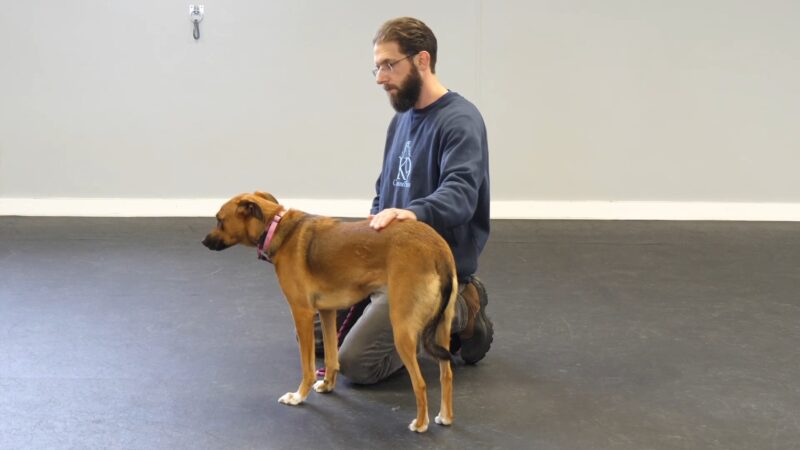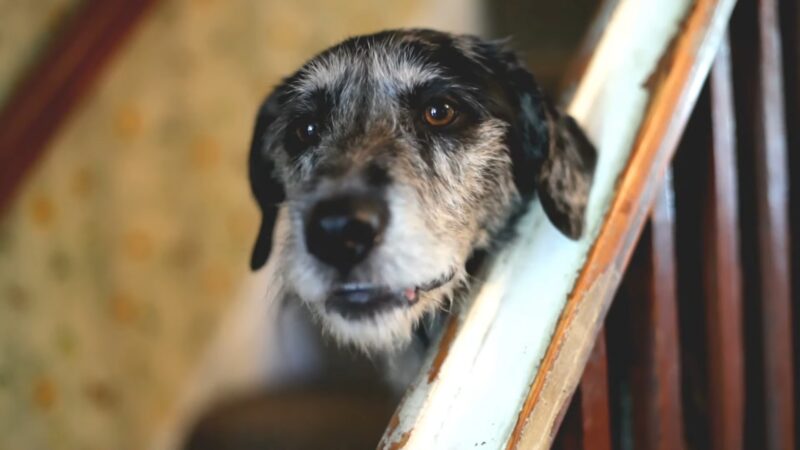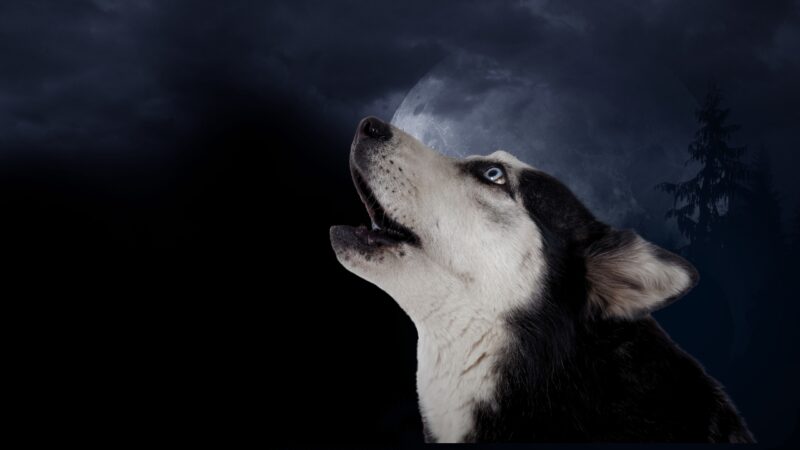The moon is high in the night sky. All is quiet, save for the distant hooting of an owl.
Suddenly, an eerie sound fills the air—your dog begins to howl, sending a chill down your spine. As a seasoned veterinarian with over twenty years of experience, I’ve had many puzzled pet owners ask me why their dogs display this nocturnal habit.
In this blog post, we’ll explore some of the fascinating reasons behind our canine companions’ night-time serenades.
Communication
Dogs, like their wolf ancestors, are social creatures. They use howling as a form of long-distance communication.
Calling the Pack
It’s around midnight when you’re jolted awake by your dog’s howl. They’re not calling out to ghosts, as some superstitions might have you believe, but instead, they’re likely signaling to their pack—which, in this case, is you.
- Dogs are descendants of wolves, creatures known for their pack behavior.
- When they howl, it can be their way of keeping in touch, especially when they’re alone or feel separated from their pack.
- It’s important to remember that your family represents their pack, and this howl can simply be a way of saying, “Where is everyone?”
Responding to Sounds
Your dog may also howl in response to certain sounds or stimuli in their environment, such as sirens or musical instruments.
- The sound of sirens or other high-pitched noises can often trigger dogs to howl. This is because the noise is similar to the frequencies of a canine’s howl.
- Even the sound of you playing a musical instrument or a song on the radio could inspire a midnight concert from your canine companion.
Anxiety and Fear

Emotional triggers can also cause your dog to howl, with anxiety and fear being common culprits.
Separation Anxiety
Just like humans, dogs can experience anxiety, and one of the most common types in dogs is separation anxiety.
- Separation anxiety can cause dogs to act out in various ways, including howling, especially at night when they’re left alone.
- If your dog only howls when you’re not home or in a different room, it could be a sign that they’re experiencing this type of anxiety.
Fear and Distress
Fear and distress due to environmental changes or traumatic events can cause your dog to howl.
- Changes in the environment, such as moving to a new home, or traumatic events like thunderstorms or fireworks, can cause distress in dogs and trigger howling.
- The howling in these situations can be a sign of their discomfort and a call for comfort.
Medical Issues

Unexplained or excessive howling might be an indication of a medical issue, making it crucial to rule out any potential health concerns.
Pain or Discomfort
Your dog’s night-time howling could be an indication that they’re in pain.
- Dogs often howl when they’re in physical discomfort or pain, especially if it’s a condition that worsens at night.
- Common issues can include arthritis, which can cause joint pain, or gastrointestinal issues, which can cause stomach discomfort.
Hearing or Cognitive Decline
If your dog is older, their howling might be due to age-related issues like hearing loss or cognitive dysfunction.
- Hearing loss can lead to increased howling as dogs try to cope with the loss of one of their major senses.
- Cognitive dysfunction, akin to dementia in humans, can cause confusion and anxiety in dogs, leading to behaviors like howling.
Breed Disposition
Certain breeds are more prone to howling than others, thanks to their genetic predisposition.
Hound Breeds
Hound breeds like Basset Hounds or Beagles are infamous for their propensity to howl.
- These dogs were bred for hunting, and their howls were a way to communicate with their human hunting partners.
- While your urban Basset Hound might not have any rabbits to chase, they still carry this howling instinct in their genes.
Northern Breeds
Breeds like Siberian Huskies and Alaskan Malamutes are known for their howling abilities.
- These breeds, often used as sled dogs in colder climates, use howling as a way to communicate over long distances.
- Even in a suburban environment, they still retain this instinct to howl, which can be triggered by a variety of factors.
Behavioral Issues

Sometimes, the cause of the howling might not be physical or emotional but purely behavioral.
Attention-Seeking Behavior
If your pet learns that howling gets your attention, they might use it to their advantage.
- Dogs are smart and quickly learn what behaviors get them the attention they crave.
- If your dog realizes that a late-night howl brings you running, they might start using it as a tool to get your attention.
Response to Routine Changes
Changes in your dog’s routine can also lead to howling behaviors.
- Your pets thrive on routine, and changes to their usual schedule—like a late work night—can cause stress and result in howling.
- Maintaining a consistent routine can help mitigate these nighttime concerts.
FAQs
1. Why has my dog started howling at night since I changed its sleeping place?
Dogs generally prefer a set routine, and changes to their environment, such as a different sleeping place, can cause them to become anxious and confused, resulting in howling. They may need some time to adjust to the new arrangement.
2. Can lack of exercise lead my dogs to howl at night?
Absolutely. They need a certain amount of exercise every day, depending on their age, breed, and health. Lack of exercise can lead to pent-up energy and boredom, which could manifest in disruptive behaviors such as howling at night. Regular exercise can help your pet feel more relaxed and sleep better.
3. Could my dog be howling at night because it’s hungry?
Yes, hunger can certainly cause this. If your four-legged friend is not getting enough food during the day, or if the time between meals is too long, it might feel hungry and express this by howling. Adjusting feeding times could help.
4. I sometimes give my dog attention when it howls at night. Could this be encouraging the behavior?
Yes, if you give your pet attention or rewards when it howls at night, you might unintentionally be reinforcing the behavior. It’s best to reward quiet behavior and ignore the howling unless it’s due to a specific need, like wanting to go outside.
5. Can my dog’s howling be a sign of separation anxiety?
Yes, one possibility is that your pet suffers from separation anxiety. This is more likely if the dog isn’t allowed to sleep with you if it has started howling after you’ve disallowed it from your bedroom, or if it shows signs of anxiety as you prepare for bed.
6. Could my dog’s howling be due to a lack of stimulation?
Yes, your four-legged friends typically require daily exercise. If they don’t get enough, abnormal behaviors, including night-time howling, might manifest. This is more likely if it howls more frequently on days it doesn’t get exercise.
10. Could my dog’s howling be due to dietary issues?
Yes, dietary problems might be causing the howling. This could be due to eating inappropriate items or not receiving essential nutrients. This is more probable if the howling is associated with certain foods or a recent diet change.
Final Words
From the echo of their wolf ancestors to a simple call for attention, understanding why your dog howls at night can help deepen the bond between you and your furry friend. When faced with this behavior, remember to stay patient and don’t hesitate to seek professional help if the howling becomes a cause for concern.
After all, it’s just one of the many ways your dog is trying to communicate with you. If you want to learn more about dog behavior, you can check out our article on why dogs lick their new puppies.

